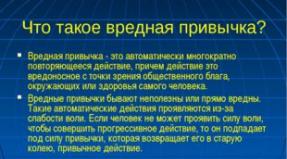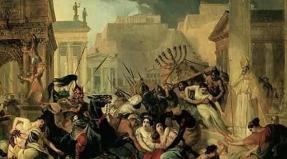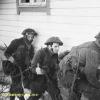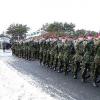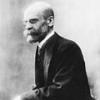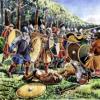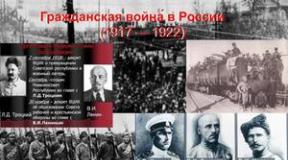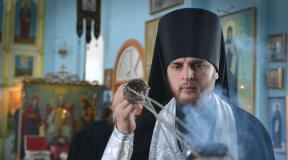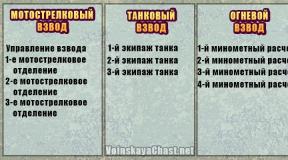Grand Duke Vsevolod: a history of government. Prince vsevolod Vsevolod 1 reign
Vsevolod I Yaroslavich photography
Father - Yaroslav I Vladimirovich, Grand Duke of Kiev.
Mother - Yaroslav's wife, Swedish princess Ingigerda, baptized Irina.
Vsevolod, the youngest and beloved son of Prince Yaroslav, was born in 1030.
In 1055, his father sent him to reign in Pereyaslavl. Almost from the very beginning of his reign, he faced the raids of the Polovtsians and managed to make peace with their prince, whose name was Bolush. This peace did not last long, and in the winter of 1061 Vsevolod's troops were defeated by the Polovtsy, who fled safely with the loot.
He supported his older brother Izyaslav, who became the Grand Duke of Kiev by his father's will. However, in 1073, he succumbed to the persuasion of his other brother, Svyatoslav, helped him to conquer the grand princely throne and expel Izyaslav from Kiev.
After the unexpected death of Svyatoslav at the very end of 1076, he began to rule in Kiev, but upon his elder brother Izyaslav's return from exile in 1077, he voluntarily ceded the grand-ducal table to him.
After the tragic death of Izyaslav in one of the internecine battles (in 1078) he became the Grand Duke of Kiev.
Best of the day
Almost all the years of Vsevolod's reign were overshadowed by internecine wars between various representatives of the princely families. Vsevolod did not have enough authority, strength or desire to stop them, although he made similar attempts.
The situation was aggravated by the constant raids of the Polovtsians, who plundered on both banks of the Dnieper, even took several cities (Pesochen on the Supoy River, Perevolok near the mouth of the Vorskla) and did not meet with resistance anywhere.
In addition, in 1092, a terrible drought hit the country, causing numerous fires, hunger and disease. According to the chronicler, in Kiev alone, from November 14, 1092 to February 1, 1093, 7,000 people died. (See: Karamzin N.M. Decree. Works. Vol. 2.P. 58.)
In the last years of his life, Vsevolod paid less and less attention to government affairs. He dismissed many of the old advisers from himself and put his trust in the young favorites; violated the old tradition, ceasing to personally administer the court at the prince's court in the presence of nobles and people. In the absence of a strong central government, appanage princes, princely governors and other officials robbed the common people no less than the Polovtsians.
According to the chronicle, Vsevolod was a kind and fair person. They wrote about him that he ruled Kiev "as a sovereign, having in himself all the virtues, such as: philanthropy, reason, meekness, gentleness and mercy", but at the same time they noticed that the prince, "enduring incessant troubles from the Polovtsy, from the Poles and from the disagreement of his own appanage princes, he was unhappy. " (Historical dictionary of Russian sovereigns, princes, tsars, emperors and empresses. 1793. Reprint reproduction. M., 1990. S. 55.)
However, despite all these excellent qualities, he was a ruler of little capacity, as N.M. Karamzin wrote, “a devout Christian, humanitarian, sober and chaste from his youth; in a word, praiseworthy between private people, but weak and consequently vicious in degree sovereigns ". (Karamzin N.M. Decree. Works. Vol. 2.S. 59.)
Vsevolod died in 1093, having bequeathed the Kiev principality to his son Vladimir Monomakh. He was buried with his father, Prince Yaroslav, in the Kiev church of St. Sophia.
Wife: Byzantine princess Anna, daughter of Emperor Constantine Monomakh.
Children: Vladimir, Rostislav.
Weakness on both sides is, as you know, a feature of all quarrels.
F. Voltaire
If you try to describe in a few words the state in which Russia was at the time when Prince Vsevolod ruled it, then it can be characterized as one big internecine war. The chronicles preserved a description of the Kiev prince, according to which he was characterized as a noble man, but weak in character.
The beginning of the reign
In the first year of his reign, 1077, Prince Vsevolod solved the problems of dividing power between himself, his children and the children of Izyaslav. Vseslav ruled in Kiev. The eldest son of Izyaslav, Svyatopolk, was sent to reign in Novgorod. Another sun of Izyaslav Yaroslavich, Yaropolk, was left in the reign of the city of Vladimir-Volynsky. Prince Vsevolod gave Chernigov to his son, Vladimir Monomakh.
The first to oppose Vsevolod was the prince of Tmutarakansky Roman Svyatoslavich, who declared his rights to the throne. Roman, together with his brother Oleg, gathered a large army, which consisted not only of Slavs, but also of hired Polovtsians, and moved to Kiev. As a result, the Grand Duke entered into secret negotiations with the Polovtsy, as a result of which a peace treaty was signed. Polovtsian mercenaries captured Roman and Oleg and moved north with them. During the campaign, Roman was killed. Oleg is taken to the island of Rhodes. Chroniclers say that Oleg stayed there for two whole years and only then was he able to return to Tmutarakan and regain the throne.
Aggravation of the situation in the country
The rule of a new internecine war, which the Rostislavichs began, continued. In 1084, they took advantage of the fact that the ruler was not in the city, and in the city itself they celebrated Easter, they gathered an army and captured Vladimir-Volynsky. Prince Vsevolod flew into a rage upon learning of this. He ordered his son Vladimir to gather an army and by force return the city to its rightful owner. The Chernigov prince fulfilled his father's will: he captured the city and severely punished the invaders.
The next war was already unleashed by Yaropolk himself. Under the influence of his advisers, he went to war against Vsevolod, who again ordered his son Vladimir to gather an army and go to the rebel. Having met with the army of Vladimir Monomakh, Yaropolk did not dare to enter the battle with him, he was frightened and fled, leaving his squad behind. According to the chroniclers, Yaropolk went to Poland in order to ask for help from the Polish king there. This plan failed. Respecting the rule of the Kiev prince, the Polish king refused Yaropolk, and did not give the army. So the prince of Volodymyr of Volynsk was forced to return to Kievan Rus in 1087 and ask forgiveness from his uncle. Prince Vsevolod believed his nephew and returned the city of Vladimir-Volynsky to his rule. Yaropolk's reign was short-lived. Just a few days after the return of the prince to the city, he was killed by his own servant. The chroniclers do not disclose the reasons for this murder.
On this, the internecine wars ended, but a new misfortune fell upon Russia. The terrible heat led to the fact that fires blazed throughout the country. Fields burned down. A terrible famine began. In the winter of 1092, in Kiev alone, over 7,000 people died from starvation and disease in three winter months. The situation was aggravated by the constant raids of the Polovtsians, who plundered and burned Russian villages.
Prince Vsevolod weakened in body from the troubles that befell the country. In 1093, anticipating a quick death, he summoned his eldest son Vladimir Monomakh from Chernigov, in whose arms he died.
reign: 1078-1093)
VSEVOLOD YAROSLAVICH (baptized - Andrew) (1030-13.04.1093) - Kiev prince in 1078-1093.
The fourth son of the Kiev prince Yaroslav Vladimirovich the Wise. After the death of his father he received the city of Pereyaslav-Yuzhny, Rostov, Suzdal, Beloozero and lands in the Upper Volga region. In 1055, Vsevolod Yaroslavich fought with the Torks, repelled the attack of the Polovtsi, agreeing with them about peace. In 1060, together with the brothers Izyaslav of Kiev, Svyatoslav of Chernigov and the Prince of Polotsk Vseslav Bryachislavich, he inflicted a tangible defeat on the Torks, who no longer tried to threaten Rus. But the very next year Vsevolod was defeated by the Polovtsians. In 1067 he took part in the campaign of the Yaroslavichs against the Polotsk prince Vseslav Bryachislavich, who seized Novgorod; the allies ravaged Minsk and defeated Vseslav in the battle at Nemiga, and then took him prisoner by deception. In September 1068 Vsevolod and his brothers were defeated by the Polovtsy in a battle on the river. Alta. Together with Izyaslav Yaroslavich, he fled to Kiev, where he witnessed the uprising of the townspeople against Izyaslav and the approval on the Kiev table of Vseslav Bryachislavich, freed from prison by the rebels. In 1069 Vsevolod and Svyatoslav acted as mediators in the negotiations between the Kievites and Izyaslav.
Vsevolod was one of the compilers of Pravda Yaroslavichi. In 1072 he took part in the transfer of the relics of the holy princes Boris and Gleb to the stone church built in Vyshgorod. The brothers' union was fragile. Already in March 1073 Vsevolod helped Svyatoslav to expel Izyaslav from Kiev. Together with Svyatoslav, Vsevolod helped the Polish king Boleslav in his struggle against the Czechs. In January 1077, after the death of Svyatoslav, Vsevolod occupied Kiev, but in July of this year he ceded the capital city to Izyaslav Yaroslavich, who relied on the support of the Poles, and took Chernigov for himself. In 1078 he was expelled from Chernigov by Svyatoslav's son Oleg and nephew Boris Vyacheslavich. Vsevolod turned to Izyaslav for help. In the battle on Nezhatina Niva, Oleg and Boris were defeated, and Vsevolod not only returned Chernigov, but also acquired Kiev, since Izyaslav fell in the same battle. Having become the prince of Kiev, Vsevolod, gave Chernigov to his son Vladimir Monomakh. His reign was not calm. The children and grandchildren of his deceased brothers Vladimir, Svyatoslav and Igor Yaroslavichi were deprived of his possessions and constantly fought with him, demanding the return of hereditary inheritances. In 1079 Vsevolod Yaroslavich repelled the invasion of the Polovtsy, led by Oleg and Roman Svyatoslavich. The cunning Kiev prince bribed the nomads, and they betrayed their brothers, and Roman was killed. In the same year, Vsevolod managed to annex Tmutarakan, the refuge of the exiled princes, to his possessions, but already in 1081 the young princes Davyd Igorevich and Volodar Rostislavich again occupied this remote area. During these years, his eldest son Vladimir Monomakh became an assistant to the aging Vsevolod. Vsevolod Yaroslavich also had two daughters: Yanka (Anna) Vsevolodovna and Evpraksia Vsevolodovna, who left their mark on the history of Europe. Vsevolod Yaroslavich was a very educated person, he knew five languages. In old age, he preferred to consult with young warriors, neglecting the advice of more experienced boyars. Vsevolod's favorites, having received important positions, began to commit abuses, about which the sick prince knew nothing, but which caused displeasure among the people of Kiev.
VSEVOLOD I YAROSLAVICH
Lived: 1030-1093
Reign years: 1076-1077, 1078-1093
Vsevolod Yaroslavich (in baptism, the name Andrew was given) was born in 1030 in Vyshgorod near Kiev. Prince of Rostov, Pereyaslavl, Suzdal. The youngest son of Princess Ingrida (Irina) and the Grand Duke. Prince of Kiev in 1076-1077. and from 1078. until the end of his life, the first ruler of Kiev, who used the title "Prince of All Russia" (reflected on his seals). Father's favorite son; during his father's lifetime he had no inheritance and lived in Kiev with his parents.
Prince Vsevolod Yaroslavich Peaceful
The people gave Vsevolod the nickname Peace-loving, because he was gentle, kind, and preferred to spend time with monks. But it was during his reign that the princely civil strife intensified. It was started by her sons, the outcast princes Oleg and Roman. In 1079, Roman hired the Polovtsians and attacked Russia. Prince Vsevolod was able to peacefully persuade the mercenaries to their side, and they killed Roman. Soon the Polovtsians captured Oleg Svyatoslavich, and he was imprisoned in the fortress. For a long time, his nephews fought against the Grand Duke: the sons of Rostislav - Rurik, Volodar and Vasilko. For pacification, Vsevolod gave everyone the possession of the city. The grandson, David, the son of Prince Igor Yaroslavich, who died early, also claimed to be reigning in any domain.
The son of Vsevolod - made certain attempts in the form of persuasion and the use of force to reconcile the many descendants of Rurik greedy for power. The princely strife was temporarily stopped.
From 1054 to 1073, Vsevolod was named as the prince of Pereyaslavl (Pereyaslavl-Russky) and was a member of the so-called "Yaroslavich triumvirate" (together with the older brothers Svyatoslav Chernigov and Izyaslav of Kiev). Prince Vsevolod the Peaceful took an equal part with his brothers in government (campaigns against nomads, a new edition of "Russian Truth", the fight against). Significant is the fact that the Pereyaslavl diocese (like the Chernigov diocese) was promoted to metropolitanate during this period.
In the early 1070s. the triumvirate fell apart. After that, Vsevolod entered into an agreement with Svyatoslav against his older brother Izyaslav, who fled to Europe. Svyatoslav occupied the Kiev table (1073), and Vsevolod, during the division of possessions between them, significantly expanded his destiny. However, in December 1076 Svyatoslav died suddenly. Vsevolod became his heir, but six months later he returned the throne to Izyaslav, who returned to Kiev, and he himself received the inheritance of the late Svyatoslav - the city of Chernigov.
In the battle on Nezhatina Niva against the exiled princes Boris Vyacheslavich and Oleg Svyatoslavich on October 3, 1078, Izyaslav died, and Vsevolod again occupied the Kiev table, now for the rest of his life.

In 1079, Roman and his brother Oleg again moved to Kiev from Tmutarakan, but Vsevolod bribed the Polovtsians, who killed Roman, and Oleg was sent to the island of Rhodes in Byzantium, where he stayed for another fifteen years. After that, Tmutarakan came under the control of Kiev.
Vsevolod Yaroslavich's board
Vsevolod had 2 wives. From a marriage with the Byzantine princess Anna, the daughter of Emperor Constantine Monomakh, a son Vladimir (future Monomakh) and a daughter Yanka (diminutive of Anna or John) were born. And the second wife, also Anna, the daughter of the Polovtsian Khan became the mother of his son Rostislav, who died young (drowned in the Stugna River) shortly after the death of his father, and 2 daughters (Yanka and Eupraxia).
Despite the fact that Vsevolod's reign was overshadowed by constant internecine wars and Polovtsian raids, compared to the large-scale crisis of the 1090s, which began after Vsevolod's death, his times were still relatively stable, and he even earned praise from the chronicler in Tale bygone years ”, written in the 1110s.

Foreign policy under Vsevolod was marked by intensive contacts with the Holy Roman Empire, for whose emperor Henry IV Prince Vsevolod married his daughter, Eupraxia-Adelheid, and later with Henry's enemy, Pope Urban II Most likely, the fact of the transition of Russia to the camp of the emperor's opponents most likely it was associated with the scandalous conflict between Henry and Eupraxia. Vsevolod's daughter fled to Verona from Germany and appeared before the pope, while accusing her husband of bullying her, participating in satanic rituals and orgies.
As a result of contacts with Rome, at the initiative of the prince, the holiday "Nicholas of Spring" was introduced in Russia, which was dedicated to the transfer of the relics of St. Nicholas of Mirlikisky in Bari (unknown to the Greek Church, he was always regarded by it not as a transfer, but as an abduction).
Vsevolod 1 Yaroslavich was one of the most educated people of his time. His son, Vladimir Monomakh, wrote in the "Instruction" that his father, "sitting at home," spoke 5 languages. Most likely, among these languages \u200b\u200bwere Greek (the language of his wife), Swedish (the language of Vsevolod's mother), as well as, possibly, Polovtsian and English (the language of his daughter-in-law, Vladimir's wife, Saxon Guides).
In 1092, new troubles befell Russia: a great pestilence and famine began, a terrible drought raged, the Polovtsy mercilessly ravaged the southern borders of the state. All these disasters undermined Vsevolod's health and on April 13, 1093 he died.
The burial of the Grand Duke Vsevolod is mentioned in a fresco in the Kiev Cathedral of St. Sophia, discovered by S. Vysotsky and recently re-analyzed by A. A. Zaliznyak: “Dmitry, Vsevolod's warrior, wrote that“ Andrey, the Russian good prince, ”died on Wednesday“ at dinner "and was buried the next day."
VSEVOLOD I Yaroslavich (1030 1093), an ancient Russian prince, a Kiev Grand Duke (c1078), the fourth son of Yaroslav the Wise (see YAROSLAV the Wise). He was one of the most educated people in Russia; knew five languages. After the death of his father (1054) he received ... encyclopedic Dictionary
Prince Lutsky, son of Yaroslav Izyaslavich Lutsky. In 1180 Vsevolod Yaroslavich went with Rurik Rostislavich, at his invitation, to his rival Svyatoslav Vsevolodovich, Prince of Chernigov, and in 1182 with this last and other princes to ... ... Biographical Dictionary
- (1030 93), Grand Duke of Kiev (from 1078). Son of Yaroslav the Wise. He is married in 1 m marriage to the daughter of the Byzantine emperor Constantine IX Monomakh (presumably Mary). He knew 5 languages. Prince in the city of Pereyaslavl Yuzhny (from 1054), in 1077 78 fought ... ... Modern encyclopedia
VSEVOLOD I YAROSLAVICH (1030 93) Prince of Pereyaslavl (from 1054), Chernigov (from 1077), Grand Duke of Kiev (from 1078), son of Yaroslav the Wise. Together with the brothers Izyaslav and Svyatoslav, he fought against the Polovtsy, participated in the compilation of Pravda ... ... Big Encyclopedic Dictionary
Prince Lutsky, son of Y. Izyaslavich Lutsky. In 1180 V. Ya. Went with Rurik Rostislavich, at his invitation, to his rival Svyatoslav Vsevolodovich, Prince of Chernigov, and in 1182 with this last and other princes against the Polovtsy. "Complete ... ... Big biographical encyclopedia
- (1030 1093) Russian prince, 4th son of Yaroslav the Wise (See Yaroslav the Wise), after whose death (1054) received Pereyaslavl South, lands along the Volga, Rostov, Suzdal and Beloozero. V. Ya. Made an alliance with the elder brothers Izyaslav and ... ... Great Soviet Encyclopedia
Prince Lutsky, son of Y. Izyaslavich Lutsky. In 1180 V. Ya. Went with Rurik Rostislavich, at his invitation, to his rival Svyatoslav Vsevolodovich, Prince of Chernigov, and in 1182 with this last and other princes against the Polovtsy. Complete ... ... Encyclopedic Dictionary of F.A. Brockhaus and I.A. Efron
- (1030 93) Russian. prince, 4th son of Yaroslav the Wise. After his death (1054) received Pereyaslavl South, lands along the Volga, Rostov, Suzdal and Beloozero. V. Ya. Made an alliance with the elder brothers Izyaslav and Svyatoslav. Together they opposed the torques ... ... Soviet Historical Encyclopedia
Vsevolod Yaroslavich, the son of Yaroslav I, was born in 1030. After his father's death, as the third oldest, he sat down in Pereyaslavl. In 1073, together with his brother Svyatoslav, he drove Izyaslav out of Kiev and moved to Chernigov. After the death of Svyatoslav for some time ... ... Biographical Dictionary
Vsevolod Svyatoslavovich Chermny (d. 1212 or September 1215) Prince of Novgorod Seversky (1202 1204), Prince of Chernigov (1204 1210 (according to another version, 1202 1210), 1214 1215), Grand Duke of Kiev (1206 1207 and 1210 1214). November 1178 ... ... Wikipedia
Books
- History of the Russian State in 12 Volumes (DVDmp3), Karamzin Nikolai Mikhailovich. The publication contains the famous "History of the Russian State", written by an outstanding Russian poet, prose writer and historian, a member of the Russian Academy (1818), an honorary member of the St. Petersburg ...

